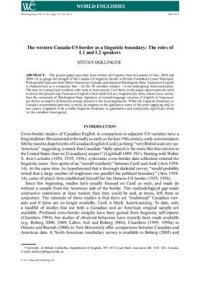
Ebook: The western Canada-US border as a linguistic boundary: The roles of L1 and L2 speakers
Author: Dollinger Stefan.
- Genre: Linguistics // Linguistics
- Tags: Языки и языкознание, Лингвистика, Социолингвистика, Языковые ситуации и языковая политика
- Language: English
- pdf
// World Englishes, 2012. Vol. 31, No. 4, pp. 519–533.The present paper uses data from written self-reports from two points of time, 2004 and 2008–10, to gauge the strength of the Canada-US linguistic border in British Columbia’s Lower Mainland. With parallel data sets from Metro Vancouver, Canada, and adjacent Washington State, Vancouver English is characterized as a vernacular that – for the 30 variables studied – is not undergoing Americanization. The data for young local residents who were at least raised, if not born, in the target regions provide solid evidence that present-day Vancouver English is best identified as a linguistically more conservative variety than the vernacular of Washington State. Speakers of second-language varieties of English in Vancouver are shown to amplify differences already present in the local population. While the linguistic boundary in Canada’s westernmost province is rarely an isogloss in the qualitative sense of the term (applying only to two cases), it appears to be a stable linguistic boundary in quantitative and statistically significant terms for the variables investigated.
Download the book The western Canada-US border as a linguistic boundary: The roles of L1 and L2 speakers for free or read online
Continue reading on any device:

Last viewed books
Related books
{related-news}
Comments (0)